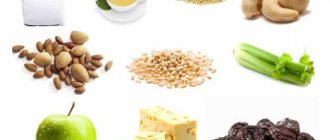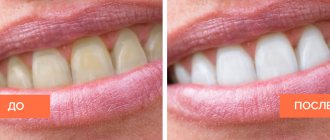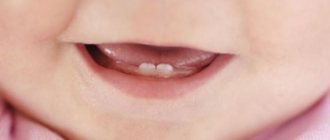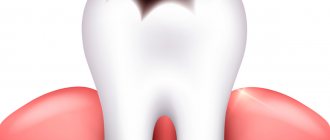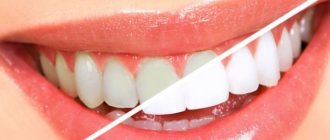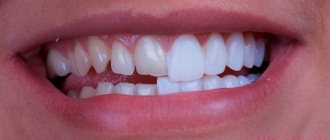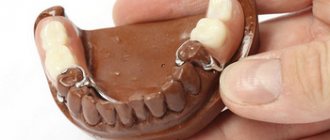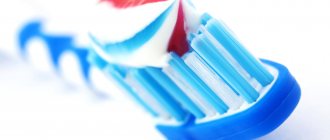15.09.2016
Author: Dentist-therapist Kuzub Yana Nikolaevna
To keep teeth healthy, both the general condition of the body, good hygiene, timely treatment, and the foods that the patient eats daily are important. Dentist-therapist at the Attribute Clinic, Yana Nikolaevna Kuzub, shares useful information about what foods and drinks are healthy, and what you should avoid to maintain a healthy smile.
WATER
Since the human body consists of more than half of water, it is logical to conclude that water is an important product for our body. Water is also good for dental health.
If you drink little water during the day (precisely water. Juices, soda, tea, coffee, soups do not count), among other negative consequences, you will experience a feeling of dry mouth. This means that not enough saliva is produced: a logical consequence of dehydration, because saliva is 98.5% water.
The composition of saliva includes mucins (no more than 0.5% of the total chemical composition of saliva). Due to them, saliva not only has viscosity and elasticity, but also prevents the formation of bacterial plaque, because blocks the proliferation of harmful microorganisms.
However, you need to know that saliva can harm your teeth if you like sweets. In this case, it will contain large amounts of glucose, as a result of which it will only harm tooth enamel.
In addition to the fact that the possibility of salivation that protects teeth depends on water, water helps to mechanically clean the oral cavity of food debris, plaque and acids harmful to tooth enamel.
Citrus
Any citrus fruit contains citric acid, which causes calcium to be washed out of the teeth. Because of it, the enamel can become more sensitive. With frequent consumption of sour citrus fruits, areas of irritation and inflammation may appear on the mucous membranes and gums.
To protect your teeth from harmful products, DentoSpas recommends:
- brush your teeth twice a day (in the morning and at night - before bed, after dinner);
- floss after every meal or snack;
- After drinking any harmful drinks, use a mouthwash that does not contain alcohol;
- eat more solid foods, greens, hard vegetables, fruits: chewing them helps clean the surface of the enamel and interdental spaces;
- It is better to drink sweet carbonated and alcoholic drinks through a straw, which will reduce the harmful effects on the enamel.
VEGETABLES, FRUITS, BERRIES, GREENS
Everyone knows that vegetables, unsweetened fruits and greens should be an important part of every person’s diet in order to maintain the balance of vitamins, minerals and other beneficial microelements in the body.
However, fresh vegetables, fruits and herbs are important for dental health, as they provide essential vitamins and minerals.
It is important to focus your diet on carrots as a source of keratin, pumpkin, which can restore white teeth due to the selenium it contains, and greens, especially spinach, which is rich in calcium.
Vegetables and greens enrich saliva with minerals that are beneficial to the health of tooth enamel (phosphate, fluoride, calcium).
It is important to understand that minerals are “leached” from teeth over time. Therefore, for the health of your teeth enamel, you must remember to eat fresh vegetables, herbs and unsweetened fruits.
Don't forget to take care of your gum health. Hard varieties of vegetables and fruits will help with this. Chewing solid food has a massage effect on the gums, thereby improving blood circulation in the mouth.
Greens will help take care of healthy oral microflora (parsley is especially good for this task), because contains antibacterial substances that can stop inflammatory processes, get rid of bad breath, and prevent caries.
TOP 10 products for healthy and beautiful teeth
TOP 10 products for healthy and beautiful teeth
1. Hard vegetables and fruits (carrots, apples, cucumbers, beets) Carrots, apples, cucumbers and beets contain many vitamins and microelements that are beneficial for teeth and gums, such as beta-carotene, vitamins B, D, E, K, C, PP, calcium, potassium, magnesium, sodium, phosphorus, iodine, fluorine, iron, cobalt and silver, which normalize blood circulation in the gums and supply calcium and phosphorus necessary for healthy teeth. Our teeth and gums become accustomed to soft, processed foods and stop functioning normally, resulting in plaque and poor circulation. Just a couple of hard vegetables or fruits a day - and your gums will be provided with a good massage, and your teeth will be free of deposits. In addition, such vegetables stimulate the secretion of saliva, which constantly washes the oral cavity and reduces the number of germs and bacteria.
2. Greens (parsley, lettuce, onion, dill, celery)
The composition of greens includes important not only for teeth, but also for the whole body as a whole, vitamins B, E, A, C, PP, potassium, calcium, magnesium, iodine, sodium, phosphorus, iron, beta-carotene and folic acid. Greens strengthen not only teeth, but also the immune system in general, help strengthen blood vessels, improve blood formation processes and eliminate bleeding from the gums. Parsley and onion have a natural antibacterial, refreshing and odor-eliminating effect, their juice penetrates into hard-to-reach places, whitens teeth, removes plaque, strengthens and massages gums.
3. Berries (currants, grapes, strawberries, cranberries)
The berries are rich in a unique combination of organic acids, pigments and pectins, and contain vitamins PP, A, group B, C, E, H, beta-carotene, calcium, magnesium, sodium, potassium, phosphorus, iron, iodine and fluorine. The juice of some berries is recommended to be used to prevent caries. For example, cranberry juice, due to its bactericidal effect, reduces the likelihood of caries. It is believed that the components of berry juices block bacteria from accessing tooth enamel. Grapes can also be used in the prevention of caries, because it contains a whole complex of minerals and trace elements that have a beneficial effect on teeth and gums. In addition, grapes contain substances that block the activity of pathogenic microbes in the oral cavity.
4. Nuts (almonds, pine nuts, cashews)
Nuts contain all essential amino acids, polyunsaturated fatty acids, vitamins A, B, C, D, E, P, as well as potassium, calcium, magnesium, phosphorus and other mineral elements that determine their high nutritional value. In addition, cashew nuts contain a unique substance that can destroy bacteria that destroy tooth enamel. It has antibacterial, antiseptic, tonic properties, and relieves toothache. Pine nuts contain vanadium, which promotes the development of bone tissue, phosphorus, which is involved in the formation and preservation of teeth and bones and plays an important role in the activity of muscles and nerve cells, calcium, which is the main component of bones and teeth and is necessary for blood clotting, cell integrity and cardiac activity. Almonds contain substances that improve the condition of teeth and gums; in addition, they have analgesic and antispasmodic effects.
5.Dairy products (cheese, cottage cheese, yogurt)
In addition to calcium, potassium, magnesium and vitamins A, B and D, which are beneficial for our body as a whole, dairy products also have a certain effect on teeth. Thus, yogurt reduces the amount of hydrogen sulfide, which is the main factor causing bad breath, quickly raises the pH level, and phosphates, calcium and casein help mineralize teeth. Cheese can be considered an effective means of preventing caries, because it increases the concentration of calcium in tooth enamel by 60% and increases the volume of saliva, which contains components that prevent the development of caries and gum inflammation. Cottage cheese contains proteins, lactic acid, iron and magnesium. It is well absorbed by the body, and the calcium and phosphorus salts that make up it are involved in the formation of bone tissue, nutrition of the nervous system and the formation of hemoglobin in the blood.
6. Citrus fruits (grapefruit, lime, orange) Citrus fruits necessarily include potassium, calcium, magnesium, sodium, phosphorus, iron, vitamins B, E, C, PP, which are so necessary for the body. Citrus aromas not only tone you up, lift your spirits, reduce drowsiness and increase attention and productivity, but also have a beneficial effect on teeth and gums. For example, eating grapefruit daily reduces bleeding gums and reduces the risk of inflammatory diseases of the oral cavity, and gum disease is the main cause of tooth loss. It is also recommended to eat lime, which helps prevent tooth decay and contains many substances beneficial for teeth and gums. Calcium and phosphorus contained in lime help enamel resist pathogens and caries, and gums improve the functioning of blood vessels and prevent bleeding. At the same time, lime contains organic acids, which, while having a slight whitening effect, do not corrode the enamel and do not destroy the natural microflora of the teeth and oral cavity. Contained in huge quantities of vitamin C in oranges, it maintains a healthy collagen network in the gums, which prevents the development of many dental ailments by destroying bacteria that cause tooth decay and gum inflammation.
7. Seafood (fish, shrimp)
From a nutritional point of view, seafood is considered an almost ideal food, because it is rich in microelements and vitamins, primarily calcium, phosphorus, fluorine, vitamins B1 and D, the insufficient presence of which leads to fragility of bone tissue, diseases of teeth and gums. These elements strengthen the health of the gums and promote the proper formation of teeth, improve complexion and hair health, and help the body strengthen the immune system. Shrimp contains calcium, thiamine, riboflavin, sodium, potassium, magnesium, phosphorus, iron and manganese that are easily absorbed by the body. The high content of calcium and fluoride affects the prevention of diseases of teeth and gums, because these minerals serve as a source for the construction of bones, the growth and preservation of teeth, the prevention of plaque formation and enamel destruction. Almost every type of fish is rich in calcium, selenium and fluorine, but the most valued is sea fish and other seafood, which, due to their high content of iodine and calcium, provide anti-caries protection for teeth.
8. Eggs (chicken, quail) A chicken egg contains proteins, fats, carbohydrates, 12 essential vitamins and almost all microelements. The vitamin D it contains is a source of phosphorus and helps prevent tooth decay, and eggshells are an ideal source of calcium, which is easily absorbed by the body, while medications such as calcium chloride, gypsum and chalk are poorly absorbed. By consuming crushed quail egg shells, you can get rid of bleeding gums and make your teeth strong and healthy.
9. Honey
Everyone knows that honey is good for health; it is not only a powerful source of energy and a means of boosting immunity, but also has a positive effect on dental health. Honey is especially rich in vitamins B and C, honey has antibacterial properties, has a general strengthening and rejuvenating effect on the body, and chewing wax honeycombs helps clean teeth and disinfect the oral cavity, effectively treats stomatitis and inflammation of mucous tissues. Propolis is used to treat periodontal disease, dental caries and gum inflammation; according to scientists, it reduces the number of enzymes that help bacteria attach to the tooth surface. In addition, about a hundred elements have been found in propolis that provide dental protection.
10. Drinks (tea, water) Both black and green tea are very beneficial for teeth, due to the content of substances that stop the development of bacteria. The antioxidant catechin, which is part of the tea, kills bacteria that cause caries and bad breath, which means that by drinking a cup of tea after a meal, we freshen our breath and cleanse the oral cavity of bacteria, thereby protecting the gums and strengthening the teeth. Clean drinking water enriched with fluoride also has a positive effect on dental health. Fluoridated water strengthens tooth enamel and prevents the occurrence of caries, inhibits the formation and accumulation of soft plaque, suppresses the vital activity of microorganisms, which leads to a decrease in the accumulation of organic acids in the oral cavity. All these products will have a positive effect not only on your teeth, but also on the entire body as a whole. By consuming them daily, you saturate your body with vitamins and minerals that are good for your health. When your teeth and gums become strong and healthy, you will want to smile more often, which means a good mood and smiles in return are guaranteed!
NUTS and SEEDS
Nuts and seeds contain substances beneficial for teeth in particularly concentrated quantities, and therefore it is extremely important to eat them regularly.
It will be good if you eat not the same type of nut always, but different varieties of seeds and nuts. Introduce walnuts and pine nuts, hazelnuts and Brazil nuts, sesame seeds, sunflower seeds, and flax into your diet. This is important because the composition of nutrients in each nut is different, and therefore the effect is different for everyone. For example, pine nuts help the development of dental bone tissue.
At the same time, remember that cracking nuts with your teeth is a procedure that is traumatic for the tooth, so it is better to avoid it. For the same reason, it is harmful to crack seeds.
Sour fruits and juices
It has been scientifically proven that acidic fruits, such as pineapples, oranges (and juices from them), destroy hard tooth tissue, although for this you need to eat kilograms of them. In any case, after eating fresh and sour fruits, you should rinse your mouth to get rid of increased acidity. It is believed that drinking juices through a straw will protect your teeth, but in fact, during swallowing, when the tongue is pressed to the upper palate and the cheeks are pulled back, rinsing still occurs in the oral cavity. Don't forget this.
Article on the topic
Drink milk and chew apples. How to eat for healthy teeth
What foods are harmful to teeth?
SWEET DRINKS
Sweet carbonated drinks are harmful to the body, especially to the teeth.
So-called soda and juice packages contain a lot of sugar, which not only destroys enamel, being a breeding ground for harmful bacteria, but also changes the chemical composition of saliva, saturating it with glucose, which also has an additional detrimental effect on dental health.
In addition, such drinks contain additives that can disrupt metabolic processes in the body.
Since sweets are harmful to teeth, you should not get carried away even with freshly squeezed natural juices, sweet fruits and berries. The fruit acids and glucose they contain can destroy tooth enamel.
Plain water will help prevent the negative effects of natural juice: just rinse your mouth with it.
SWEETS
Sweets can not only destroy a tooth, but also interfere with its natural restoration, because... The sugar they contain interferes with the absorption of calcium.
The only permitted sweet product can be dark chocolate, but only with a very high cocoa content. This chocolate can even prevent plaque because it contains antibacterial substances.
And if you really want to, please don’t forget to use dental floss after eating and rinse your mouth with water after eating.
DRIED FRUITS
This seemingly useful product, from the point of view of dental health, has a significant drawback - the viscosity of the product structure. This causes them to stick and get stuck in your teeth. Therefore, after eating dried fruits, you should not forget to use dental floss.
CAFFEINE
Coffee and other drinks containing caffeine dehydrate the body, interfere with absorption, and lead to vitamin and mineral deficiencies (including calcium). If you find it difficult to give up coffee, replace it with chicory.
Many people do not know that caffeine is found not only in coffee, but also in black and, especially, green tea. So if you like green tea (or black), try replacing it with herbal tea.
SIMPLE CARBOHYDRATES
And again about sugar. It is found not only in sweets and sugar. Simple sugars are part of starch, which, among other things, consists of potatoes (which is why dishes made from them are so unhealthy), and high-grade white flour.
If you find it difficult to give up flour products, switch to products that include whole grain flour.
ALCOHOL and MEDICINES
When drinking alcoholic drinks, try to dilute them with water, if possible, and then brush your teeth. In addition to the fact that alcohol contains a lot of sugar, which has a detrimental effect on enamel, it also causes dehydration, which means that the production of saliva, an important tool for protecting teeth and oral microflora, is reduced.
Just like alcohol, some medications can cause dehydration, so be sure to drink plenty of fluids while taking your medications.
Roasted nuts and seeds
Only fresh nuts and seeds, in particular, are good for the body and teeth. Fried ones, on the contrary, are harmful. And here's why: the beneficial substances contained in the fresh product are destroyed during the frying process. Moreover, harmful substances are formed in large quantities.
If you can't avoid roasted nuts or seeds, it will be less harmful to your health if you buy them fresh and only lightly roast them yourself at home.
Caffeine
Drinks containing caffeine (any type of coffee, cola, energy drinks) provoke dehydration and slow down the absorption of vitamins and minerals (including calcium). They stain teeth, change the color of enamel, making it darker. Therefore, dentists at the Dentospas clinic do not recommend drinking coffee in large quantities.
Caffeine also has beneficial properties: it contains fluoride and has an antibacterial effect, but coffee drinks do more harm to teeth than good. You can replace coffee with chicory. For those who are used to drinking a lot of green tea, it is better to switch to herbal teas.
You have questions?
We will call you back within 30 seconds
+7
How to keep your teeth healthy until old age? The key to success is consistency
It is not difficult to achieve success in maintaining your health, provided that you deal with this issue not from time to time, but on an ongoing basis. One-time measures are practically useless here, and if you make the rules of care your regular habit, success is guaranteed.
- Rule number one is brushing your teeth daily. At the same time, the task becomes somewhat more complicated - the procedure should last at least three minutes, and its goal should not be a dazzling shine, but a thorough cleaning of the interdental space and the most inaccessible places where food debris accumulates.
- Taking care of your teeth after eating is just as important as washing your face in the morning. It is important to choose the right toothpaste. Rinsing with clean water or a weak saline solution will help completely remove food particles and make your mouth cleaner.
- Changing a toothbrush is not only a matter of cleaning quality, but also of your personal hygiene. In a humid environment, many bacteria accumulate inside the bristles, which “like” to live in the oral cavity. Only replacing the brush will protect you from their intervention and at the same time qualitatively improve the cleaning process due to the good stiffness of the bristles.
- A competent approach to choosing a brush. The priority here is for models of medium hardness, which effectively clean the teeth and do not injure the gum tissue. A bias towards excess hardness or softness can cause bleeding of the mucous membrane or make cleaning practically useless.
- An electric brush is a minimum of risk, maximum of convenience and excellent quality of the process - your smile will captivate others with its impeccable appearance, and visits to the dentist will become only preventative.
- Chewing gum: when image is nothing, and the desire to maintain healthy teeth is everything. If you don’t have a toothbrush at hand and you’ve just had a snack, use chewing gum, which will easily cleanse your mouth of food debris and restore freshness to your breath.
- Dental floss. Simple, fast, safe and very effective when it comes to removing coarse food residues that cause significant inconvenience.
- Rinsing is the best way to prevent or slow down the development of oral inflammation and freshen your breath. Choose the appropriate antibacterial composition and remember to use it with the recommended frequency to experience the pleasant effect of freshness.
- Using fluoride toothpaste, especially recommended for smokers. If you are not yet able to give up this habit, make sure that it causes minimal harm to your teeth. In the ASEPTA line this is the ASEPTA PLUS Coffee and Tobacco paste. The chemical composition is selected in such a way as to strengthen tooth enamel and improve its appearance, while promoting its mineralization and freshening breath.
- Changing toothpaste is not just an opportunity to test the effectiveness of different dental products, but also the best chance to cope with microbes that quickly get used to the composition of the paste and do not respond to its action. By giving preference to ASEPTA pastes, you will provide your teeth and gums with professional care at home, which will have the most positive effect on their health.
And, of course, visit the dentist at least once every six months. Only in this case will it be possible to recognize and eliminate a serious disease in time, preserving the integrity of the dentition and avoiding long, painful and expensive treatment.
What measures should be taken to maintain dental health during and after meals?
It is necessary, if possible, to avoid snacking between meals, since tooth enamel can be restored during those few hours when a person does not eat anything. In addition, you should not eat too cold or too hot food, especially dishes that contrast with each other in temperature, to prevent the formation of microcracks in the enamel. What you eat must be chewed thoroughly and intensively. Avoid foods that are too hard and require effort to chew. Juices should be drunk through a straw. Acid-containing fruits and citrus fruits are best chewed and swallowed quickly.
After meals, you can use chewing gum in which the sugar is replaced with dental-safe sweeteners (for example, xylitol). When consuming seeds, baked goods and confectionery products containing them, as well as corn in any form, you cannot do without a toothpick. After each consumption of sugar-containing and acidic foods, it is necessary to thoroughly rinse the mouth with water or a special elixir or brush your teeth.
How to save enamel?
This list of harmful foods does not mean at all that now you should not eat porridge, dried fruits and cannot afford a sip of soda if you really want to. You just need to remember that if you have eaten anything from this “prohibited list,” you need to brush your teeth or at least rinse your mouth, but in no case pick at them with toothpicks or mechanically impact your teeth and gums, except with a toothbrush and irrigator.
Of course, modern pharmaceuticals offer all kinds of means for remineralization and strengthening of enamel. However, you need to understand that its cultivation and restoration does not occur. The maximum that we can achieve using biological pastes and gels is to create a kind of hermetic environment around the tooth, its external minimal protection. In addition, it is worth considering that there are medicinal pastes that are prescribed by the doctor, and there are pastes from the group that I call “supermarket”. The latter can only mask the source of the problem, but nothing more. To carry out successful remineralization, you will first need professional dental treatment - it is important to thoroughly clean the tissues, and here you cannot do without professional hygiene.
Products hazardous to teeth
When a person eats sweet or starchy foods, he feeds not only himself, but also the bacteria that live in the mouth and cause tooth decay, as well as various gum diseases. This means that the list of foods that are most dangerous for teeth includes:
- lollipops and sticky candies - if you don’t have the strength to completely give up sweets, which would be the best solution for your teeth, then you should choose sweets that linger in the oral cavity for a minimum time;
- bread and other starchy foods - during the chewing process, such foods turn into a sticky substance that gets clogged in the crevices between the teeth and creates ideal conditions for the growth of bacteria;
- sweet sodas - many drinks in this category contain citric and phosphoric acid, which cause thinning of tooth enamel.
To avoid damaging your teeth, do not try to bite into very hard foods, such as caramel or ice from drinks.
Jam and berries with small seeds
Seeds from raspberries, strawberries, blackberries and other berries can get stuck between teeth and in fissures (small grooves and depressions on the chewing surface of the teeth). If they are not removed quickly and correctly, this will inevitably lead to unpleasant consequences.
Treat without a drill. What procedures have dentists refused? More details
The beauty of a smile and your favorite food: where is the connection?
The food we eat has a huge impact on our teeth.
On the one hand, it is a source of vitamins and minerals that are necessary for healthy growth and development of teeth, enamel strength and good gum health.
But on the other hand, some products can damage teeth, stain enamel and promote the development of harmful microflora. “Fortunately, these foods, such as candy, are usually harmless in moderation,” says dentist Matthew Messina, a spokesman for the American Dental Association. “Problems arise when we get too carried away with one product.”
